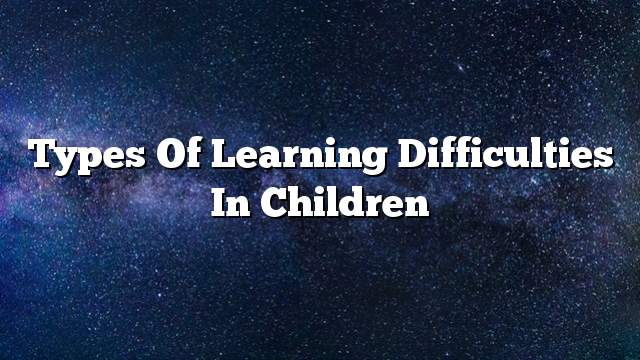learning difficulties
Difficulties learning from the problems that arise in childhood, and affect the future of the suffering and life, and the extent of its response to the surrounding community, where they need from childhood to the special care of parents at home and abroad, and teachers in schools to interact positively.
Definition of learning difficulties
Learning disabilities are a general term that refers to the problems that affect the child in the learning process, such as: cognition, attention, or reading called dyslexia, spelling, writing, pronunciation, or arithmetic, or skills related to these characteristics, These problems are caused by the presence of neurological factors that influence the growth of verbal and nonverbal abilities.
Types of learning difficulties
Developmental learning difficulties
Developmental skills are the skills that a child needs in order to achieve good academic achievement. These include attention, memory, and cognition. For example, when a child begins to learn his name, he must possess the skill of cognitive and kinetic coordination, coordination of eye and hand movement, sequence, memory and others. But if the injury is large and can not be solved, the child’s condition is diagnosed with the difficulty of learning to write, spell, or perform calculations.
Academic learning difficulties
Academic learning difficulties are the most common problems, especially among school students; they are clearly visible in the child, including:
Difficulties of reading, writing, spelling, written expression, and account difficulties.
Reasons for learning difficulties
- Brain defects: These defects affect the fetus during pregnancy, affecting the formation of neurons and their connection to each other.
- Inheritance: The prevalence of learning difficulties among certain family members is noted, and it is believed to be due to genetic causes.
- Problems in pregnancy and childbirth: For example, in some cases, the mother’s immune system attacks the fetus as if it were a strange object, which may lead to abnormal growth of the nervous system of the fetus. The torsion of the umbilical cord around the child during the birth can lead to a sudden decrease in Which can cause the child to suffer from learning difficulties. These behaviors include smoking, drinking alcohol, or taking certain types of medications. Serious.
- Pollution problems and environment that affect neuronal growth.
